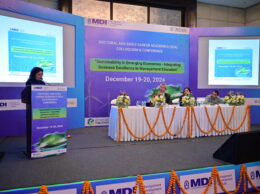DELHI, INDIA: Enterprise risk management intelligence is a critical requirement for both organisational and individual success. A key finding of a survey conducted by the IRM’s India Regional Group in collaboration with AICTE, found that education institutions in India still have a long way to go when it comes to delivering Enterprise Risk Management (ERM) education.
The publication ‘Enterprise Risk Management and the Indian Higher Education System’ drew responses from over one thousand Indian institutions. This initiative is engaging with higher educational bodies to help them to improve risk management education, while focusing on embedding ERM education across the country.
The research was led by Dr. Shashank Shah, SAI Fellow’17, Harvard University, Board Research Chair, IRM India Affiliate; and Dr. Sapna Malya, Associate Professor – Finance, SPJIMR, Project Co-Chair, IRM India Affiliate.
Nearly 96% of the responding institutions considered risk literacy as critical for both organisational and personal success. Yet, only 27% of institutions believe ERM courses should be offered at the undergraduate and postgraduate levels. Not surprisingly, only 19% of these institutes thought that their students had high risk literacy.
Given that 60% of the respondent institutions were affiliated with universities that exercised control over their course framework, there was a general consensus on the need for regulations that emphasise better risk education, for improving risk literacy among students. This was evident as 82% of the study participants believed that academic regulators mandating a formal ERM framework would help the teaching-learning process. The lack of risk preparedness extends to the institutional level, with only 37% employing a dedicated risk officer or faculty to advise the school’s leadership team on institutional risks.
Commenting on the survey, Hersh Shah, Chairman, IRM India Regional Group, said:
“Our survey reveals a worrying gap between the need for ERM and the risk literacy of India’s graduate and post-graduate students.
Global events leading to business collapse to risk related events demonstrate the consequences of ignoring organisational-wide risk management issues ranging from cyber-attacks – supply chain – reputational damage.
This lack of risk preparedness among India’s emerging workforce is a matter of grave concern. To build a robust and resilient economy, we must urgently address the gap in the system by strengthening the curriculum framework to promote ERM education across our higher educational institutions. In addition, there must be a sustained and systematic process to ensure the inclusion of new and emerging courses on the subject”.
Prof. Anil D Sahasrabudhe, Chairman, AICTE, added:
“Although the corporate world is now taking a proactive approach towards strengthening their risk management frameworks, academia is still, unfortunately, lagging behind. AICTE partnered with IRM with the view of raising awareness about risk management in our higher educational institutions.
The findings of the survey should motivate all the stakeholders, including academic institutions, students, instructors, the government, and organisations who depend on these schools for their workforce, towards greater introspection. We hope that this survey will help induce greater impetus towards strengthening risk management, both at the institutional level, and in building higher education curriculums across the country. With an increasing regulatory focus on risk management, there is a rising demand for qualified ERM and risk-intelligent professionals across every sector. Now, the onus lies with us, in academia, to ensure that our students are ready to take on the challenges of Industry 4.0.
We recognise IRM’s global leadership in ERM qualifications and examinations across 140+ countries and are confident of the support that they can provide to education institutions in creating qualified risk-ready professionals.”









